แนวคิดเชิงระบบ: ทำอย่างไรเด็กปฐมวัยจะไม่เลือกกิน
คำสำคัญ:
เด็กปฐมวัย, การเลือกกิน, แนวคิดเชิงระบบบทคัดย่อ
การเลือกกินของเด็กปฐมวัยคือการปฏิเสธการทดลองกินอาหารที่แปลกใหม่หรืออาหารบางกลุ่ม เลือกกินเฉพาะอาหารปรุงแบบที่ตนเองชอบ ใช้ระยะเวลากินนานหรือไม่ยอมกิน สร้างปัญหานำไปสู่พฤติกรรมอันไม่พึงประสงค์ มีผลทำให้โครงสร้างร่างกายไม่สมส่วนและขาดโอกาสสร้างความสัมพันธ์ที่ดีกับบุคคลอื่น สาเหตุการเลือกกินมาจากหลายปัจจัย ได้แก่ ความผิดปกติของร่างกาย พฤติกรรมของผู้เลี้ยงดู และสภาพแวดล้อมไม่เอื้อต่อการเลี้ยงดู บทความนี้จึงมีวัตถุประสงค์เพื่ออธิบายความสัมพันธ์ขององค์ประกอบสาเหตุและผลกระทบการเลือกกินของเด็กปฐมวัย บอกระดับความรุนแรงของสาเหตุและผลกระทบเพื่อนำไปสู่การประยุกต์ใช้สำหรับการป้องกันและแก้ปัญหาการเลือกกิน ใช้การอธิบายผ่านแนวคิดเชิงระบบซึ่งประกอบด้วย สิ่งนำเข้า กระบวนการดำเนินการ ผลลัพธ์ที่ได้และผลย้อนกลับ ผลสรุปที่ได้สามารถนำไปปรับใช้ในการป้องกันและแก้ปัญหาอื่นของเด็กปฐมวัยให้ได้อย่างเป็นระบบในแต่ละกรณีไป
เอกสารอ้างอิง
Ministry of Education. Early childhood care and education [Internet]. Bangkok: Office of the Education Council; 2013 [cited 2020 Oct 1]. Available from: http://backoffice.onec.go.th/uploads/Book/1233-file.pdf
The Working Group created the reference criteria. Reference criteria for weight, height and nutritional indicators of Thai people aged 1 day-19 years. Department of Health, Ministry of Public Health, Thailand; 1999. (in Thai)
Chansang T. Surveillance of sanitation, food and water in schools in the 2nd health center area. 2nd Health Center, Department of Health, Saraburi, Thailand; 2013. (in Thai)
Soontornchai S. Early childhood diet and nutrition teaching document unit 1. Nontaburi: Sukhothai Thammathirat University, Nontaburi, Thailand; 2013. (in Thai)
Singhasem P, Suwanaweha S, Sornkasetrin A. Promoting nutrition in preschool children. The Southern College Network Journal of Nursing and Public Health 2017; 4(3): 226-35. (in Thai)
Kwon KM. Association between picky eating behaviors and nutritional status in early childhood: Performance of a picky eating behavior questionnaire. Nutrients 2017; 9(5): 1-15.
Bureau of Nutrition, Department of Health, Ministry of Public Health. Guidelines for the implementation of nutrition health promotion in good child health clinics for public health personnel. Nonthaburi, Thailand; 2015. (in Thai)
National Statistical Office. Survey of the situation of children and women in Thailand project 2019 complete report 2020. Bangkok, National Statistical Office of Thailand; 2020. (in Thai)
Choomai T. Early childhood growth and development. Hua Hin Sook Jai Klai Kangwon Journal 2017; 1(2): 18-33. (in Thai)
Caroline M. Taylor. Picky/fussy eating in children: Review of definitions, assessment, prevalence and dietary intakes. Appetite 2015; 95: 349-59.
Limtasophon D. Nursing care to help children who have difficulty eating. Journal of Nursing and Health Care 2016; 34(4): 6-13. (in Thai)
Leung AKc, MarchandV, SauveRS. The‘picky eater’: The toddler or preschooler who does not eat. Paediatric Child Health 2012; 17(8): 455-7.
Neilson N, Saksing J, Chompoomee A, Jantawesuk S, Taviwat O. The development of risk management total abdominal hysterectomy perioperative nursing at Sunpasitthiprasong hotpital Ubonratchathani provine. Journal of Nursing Science and Health 2020; 43(30): 68-78. (in Thai)
Paopeng C. Differences in dietary behavior of the Thai population: How population, socio-economic characteristics and health status affect. Journal of Health Systems Research 2017; 11(3): 316-25. (in Thai)
Carruth BR, Ziegler PJ, Gordon A, Barr SI. Prevalence of picky eaters among infants and toddlers and their caregivers' decisions about offering a new food. J Am Diet Assoc 2004; 104: 57-64.
Yeunyong S, Moopayak K, Suwanarup N. A comparative study of factors related to nutritional status in preschool children in Muang district, Suphanburi province. Thai Journal of Nursing 2012; 30(2): 90-100. (in Thai)
Wardle J, Guthrie CA, Sanderson S, Rapoport L. Development of the children’s eating behaviour questionnaire. Journal of Child Psychology and Psychiatry 2001; 42(7): 963-70.
Jung HJ, Han SN, Song S, Paik HY, Baik HW, Joung H, et al. Association between adherence to the Korean food guidance system and the risk of metabolic abnormalities in Koreans. Nutr Res Pract 2011;5(6):560–8.
Thai Health Project. 2014. How fat is Thai people, Thai health. Nakhon Pathom: Institute for Population and Social Research, Mahidol University, Nakhon Pathom; 2014: p.10-11. (in Thai)
Institute for Population and Social Research, Mahidol University. Thai Health 2020: Two decadesof reforming Thaieducation: Failureand success. 1st ed. NakhonPathom: AmarinPrinting and Publishing; 2020. (in Thai)
Aekplakorn W. Report of the Thai people’s health survey by physical examination 5th in 2014: Children health. Bangkok: Health System Research Institute; 2014. (in Thai)
Forrester JW. System dynamics, systems thinking, and soft OR. School of Management Massachusetts Institute of Technology Cambridge, MA, 02139; 1994.
Siriburanapipatana P. Pediatric nursing 7th ed. Academic welfare program, Praboromarajchanok Institute, Ministry of Public Health. Nonthaburi, Yutharin Printing Co., Ltd. 2012. (in Thai)
Musikasukon S. Children's nursing textbook 2nd ed. Bangkok: Limited pre-one partnership; 2012. (in Thai)
Ong-Ad W, Pinyo-anantapong S. The study of food consumption behavior of early childhood children in school affiliation, Journal of Education 2016;17(2):13-27. (in Thai)
ดาวน์โหลด
เผยแพร่แล้ว
รูปแบบการอ้างอิง
ฉบับ
ประเภทบทความ
สัญญาอนุญาต
วารสารพยาบาลศาสตร์และสุขภาพเป็นเจ้าของลิขสิทธิ์ในการเผยแพร่ผลงานที่ตีพิมพ์ห้ามผู้ใดนำบทความที่ได้รับการตีพิมพ์ในวารสารพยาบาลศาสตร์และสุขภาพไปเผยแพร่ในลักษณะต่าง ๆ ดังนี้ การนำบทความไปเผยแพร่ออนไลน์ การถ่ายเอกสารบทความเพื่อกิจกรรมที่ไม่ใช่การเรียนการสอน การส่งบทความไปตีพิมพ์เผยแพร่ที่อื่น ยกเว้นเสียแต่ได้รับอนุญาตจากวารสารพยาบาลศาสตร์และสุขภาพ



